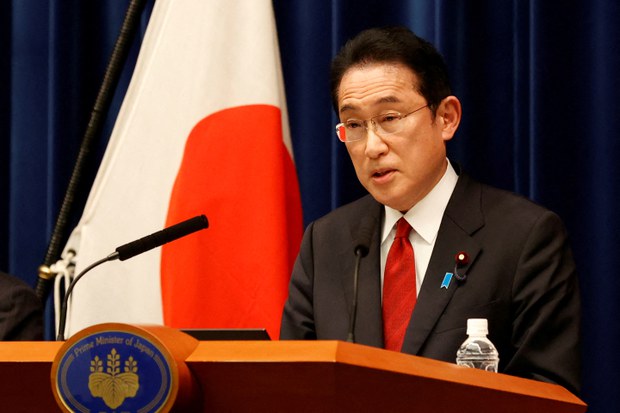Japan PM, Fumio Kishida Set to Visit Southeast Asia in Late April 2022
pada tanggal
Friday, April 15, 2022
Edit
 |
| Japanese Prime Minister Fumio Kishida speaks during a news conference at the Prime Minister’s official residence, in Tokyo, April 8, 2022. - (Reuters) |
TOKYO, LELEMUKU.COM - Japanese Prime Minister Fumio Kishida is planning a visit to Southeast Asia later this month to counter China’s growing assertiveness in the region, according to news reports and a government official.
Kyodo, a Japanese news agency, said Kishida’s trip would take place during the so-called Golden Week holidays and include stops in Thailand, Indonesia and Vietnam. The report cited unnamed diplomatic sources.
Golden Week 2022 runs from April 29 to May 5. It starts with Showa Day and ends on Children’s Day, with a five-day consecutive holiday from May 1–5.
Kyodo also reported that Kishida may consider a visit to Europe during the holiday period. A previously proposed meeting between ministers of defense and foreign affairs from Japan and India in mid- to late-April may therefore have been postponed because foreign ministers usually accompany the prime minister on his foreign trips.
Radio Free Asia (RFA), with which BenarNews is affiliated, has approached the Japanese Foreign Ministry for confirmation.
In Jakarta on Thursday, Teuku Faizasyah, spokesman for the Ministry of Foreign Affairs, confirmed to BenarNews that Kishida would visit Indonesia “at the end of April.” He said the exact date would be announced later.
Kyodo reported that in Southeast Asia, the Japanese prime minister is expected to “underscore cooperation toward realizing the vision of a free and open Indo-Pacific amid China's rise.”
Thailand and Indonesia are this year’s chairs of the Asia-Pacific Economic Cooperation forum (APEC) and the Group of 20, respectively.
Vietnam, meanwhile, shares interest with Japan in safeguarding maritime security in the South China Sea, where China holds expansive claims and has been militarizing reclaimed islands.
Free and open Indo-Pacific
“China is the principal geopolitical threat, be it for India, Japan or Southeast Asian countries,” said Pratnashree Basu, associate fellow at the Observer Research Foundation, an Indian think-tank.
“Pooling resources and strengthening capacities is therefore an ongoing process for almost all countries in the Indo-Pacific in order to be in positions of stronger pushback in the face of China's aggression,” she said.
Last year, Japan joined a growing list of countries that are challenging China’s maritime claims in the South China Sea. Tokyo sent a diplomatic note to the United Nations rejecting China’s baseline claims and denouncing what it described as efforts to limit the freedom of navigation and overflight.
Japan is not a South China Sea claimant, but Tokyo has deepened security ties with several Southeast Asia nations with claims or interests there.
The Japanese Navy and Coastguard have conducted joint exercises with Malaysia, Indonesia, the Philippines and Vietnam.
Japan prioritizes maintaining stability and a rules-based approach to governing the South China Sea as its sea lanes are critical arteries for the Japanese economy, according to Stephen Nagy, a senior associate professor at the Department of Politics and International Studies at the International Christian University in Tokyo.
Tokyo has also been playing an important role in supporting the U.S. Indo-Pacific strategy.
Leaders of the Quadrilateral Security Dialogue, or Quad, including Japan, the U.S., Australia and India are meeting in person later in May in Tokyo for a summit.
The Quad is widely seen as countering China’s weight in the region.
Kishida visited India and Cambodia in March, his first bilateral trips since taking office in October 2021. Cambodia is the current chair of the Association of Southeast Asian Nations. (Tria Dianti/ BenarNews)